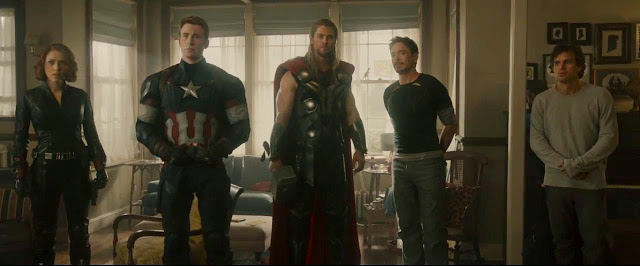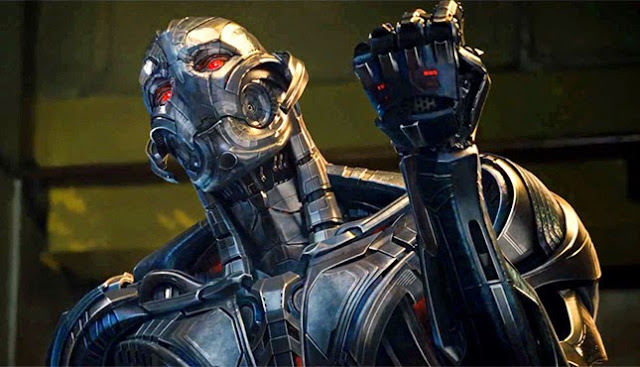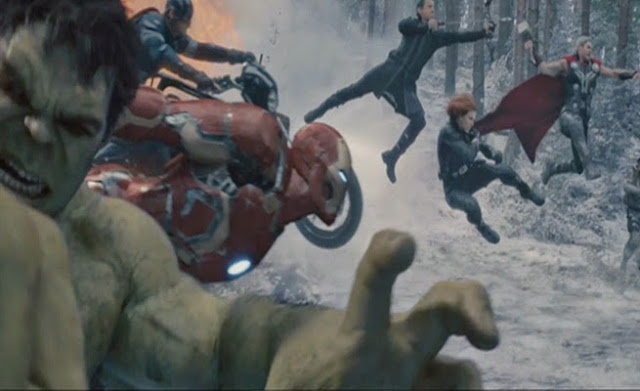It seems ludicrous that I should pity Joss Whedon. A visionary so accustomed to having his magical creations snuffed out by the pitiless forces of commerce and TV ratings, he has finally ascended to the summit, piloting the most unstoppable comic-book franchise in cinematic history. Yet after watching Avengers: Age of Ultron, which Whedon both wrote and directed, I cannot escape the feeling that he is exhausted, browbeaten, defeated. He has acquired an unlimited budget and a top-notch cast, not to mention the adoration of legions of fans. But in his feverish efforts to satisfy those fans, he has made not so much a movie as a bloated, hulking anthology, a cluttered collection that dutifully affords screen time and subplots to each of its many, many heroes. There are few films where more happens, but in this movie, more is somehow less.
This is not to say that Age of Ultron is entirely lacking in personality. Whedon’s dialogue still sings, and his gift for witty, easygoing banter remains evident. There are numerous character-driven scenes in which the film’s noisy, explosive bedlam surrenders to pensive, welcome quiet. The problem is that rather than forming the fulcrum of the movie, these human moments feel shoehorned into the larger narrative, stolen respites wedged between the obligatory scenes of violence and spectacle. I am not suggesting that Age of Ultron should have been entirely bereft of action. I simply wish that its action served a greater purpose beyond sating hungry viewers’ appetites with such rote sound and fury.
For a time, it seems like it might. When Age of Ultron opens, our heroes are invading the fictional European country of Sokovia, attempting to recover the mythical scepter that Tom Hiddleston’s Loki (sadly absent from this installment) left behind following the events of the first film. The details hardly matter, except one: During the assault, Iron Man, aka Tony Stark (Robert Downey Jr., flashing some depth), dispatches a fleet of automated Iron Man clones to the city’s square. They bear messages of peace, urging the locals to evacuate for their own safety, but the citizenry are none too pleased, hurling objects at the robots and clamoring for a riot. In the age of Ferguson and Freddie Gray, of Syria and drone warfare, this is a dangerous and provocative image. Could Age of Ultron serve as an allegory to our modern turmoil of police power and global unrest?
Yes and no. Turns out, this preoccupation with the rightness of military might is just one of many story threads that Whedon attempts to weave throughout the picture. Every character has his own crisis to grapple with, her own backstory to overcome. Steve Rogers/Captain America (Chris Evans, steady), for example, ponders his value as a soldier, wondering if he must subjugate his personal desires for happiness to his solemn, unceasing duty to save the world. Natasha Romanoff/Black Widow (Scarlett Johansson, sowing the seeds for the inevitable spinoff) is tormented with visions from her dark past, even as she is cautiously pursuing an awkward, tentative romance with Dr. Bruce Banner (Mark Ruffalo, quiet and persuasive), which is complicated by the latter’s tendency to transform into The Hulk. Meanwhile, Thor (Chris Hemsworth, still born for the part) is also worried about, er, something. (An actual god, Thor is undoubtedly the strongest of the Avengers, which also makes him the least interesting, although his fabled, immovable hammer proves a reliable source of laughs.) And then there is Clint Barton/Hawkeye (Jeremy Renner, excellent), who seems to have miraculously located the balance that eludes Rogers, ably doing his job as an avenger while also living out a modest, untroubled life on a remote farm with his wife, Laura (Linda Cardellini), and their children.
That’s enough material for at least four standalone movies, but in Age of Ultron, the rest of the Avengers are mere sidekicks to Tony Stark, at least from the perspective of the plot. Stark, who in an early scene confronts a glimpse of a dystopian future where his comrades are all dead (Captain America’s iconic star-spangled shield is even cleaved in two, an obvious but effective visual metaphor), is paralyzed with the fear of failing in his duty to protect the planet from alien invaders. And so, he convinces Dr. Banner—the two of whom spend an inordinate amount of time staring at holographic screens—to help implement the Ultron program, a massive artificial intelligence that functions as a disembodied planetary defense system, one Stark characterizes as “a suit of armor around the world”. Surprise: Things go wrong.
Or very right, at least in terms of entertainment. Rather than doing Stark’s bidding as an incorporeal sentinel, Ultron springs to glorious, metallic life as a sneering, malicious robot, given inimitable voice by James Spader. I’m sure Ultron is derived from Marvel’s comics, but he feels like a pure Whedon creation, all withering sarcasm and terrifying malevolence. There is nothing especially unique about Ultron’s brand of megalomaniacal villainy; he’s basically a garden-variety nihilist who seeks to annihilate the Avengers, plus wipe out the rest of humanity for good measure. But his swaggering arrogance, combined with his caustic humor and Spader’s chilling intonation, make him magnetic. When he saunters into a late-night revelry, aluminum skeleton clanking, he casually informs the Avengers that their age is at an end, and the message is clear: The games are over. It’s time for war.
This is all highly promising, and the potential only deepens when Ultron recruits to his cause the Maximoff twins: Pietro, aka Quicksilver (Aaron Taylor-Johnson, miscast), and Wanda, aka Scarlet Witch (Elizabeth Olsen, perfectly cast). Quicksilver’s power is self-explanatory—he’s essentially a meaner version of Dash from The Incredibles—but Scarlet Witch is a more insidious and inscrutable villain; when she nears another person, tendrils of crimson light creep out from her fingers, allowing her to alter her foe’s mind. (As Cobie Smulders’ Maria Hill sums up the twins: “He’s fast and she’s weird.”) The twins have a long-simmering vendetta against Stark, which teases the possibility for real conflict, and their collaboration with Ultron is initially tantalizing.
Which makes the latter part of Avengers: Age of Ultron all the more disappointing. The second half of the film is essentially a series of extended action sequences, each of which feels thuddingly impersonal and obligatory. Whedon is a world-class writer, but his credentials as an action filmmaker are less certain. There is nothing inherently wrong with CGI-assisted carnage, provided that it is ably choreographed. But apart from the movie’s tremendous opening sequence—a fluid tracking shot that adroitly shifts perspectives from one Avenger to another—the battle scenes in Age of Ultron are lumbering and familiar. Sadly, Whedon’s greatest miscalculation proves to be Ultron himself, or rather, his decision to allow Ultron to propagate into an army of indistinguishable robot clones. As a single entity, Ultron is charismatic and mesmerizing, thanks to Spader’s snarl and Whedon’s wit. (Sample quip: “I’m glad you asked that, because I wanted to take this time to explain my evil plan.”) But multiplying him only dilutes him. Watching one Ultron trade barbs and blows with Iron Man is compelling. Watching 50 mini-Ultrons get swallowed up in an explosion feels like dental work.
Ultron’s multiplicity also holds up a mirror to the fatal flaw of any superhero movie: the plight of the helpless civilian. Just as our heroes must fight valiantly in order to save faceless extras, here they must also destroy faceless robots. It is all loud and impressive and thoroughly lacking in distinction or flair. (A late-film interlude, in which the Avengers briefly retire to Barton’s farm, feels blissful in its warmth and intimacy, which only makes the action scenes seem duller and more lifeless by comparison.) It is not quite that Whedon is an unskilled director of mayhem; it’s just that he seems bored. You sense that he’s straining under Marvel’s mandate, a directive to supply as much chaos and spectacle as possible. And so, there is an interminable fight between Iron Man and the Hulk, in which many punches are exchanged, much property is destroyed, and nothing of consequence actually occurs. There is a single moment of charm in that sequence—when Iron Man repeatedly pummels the Hulk with lightning-fast jabs as Stark rapidly mutters “Go to sleep, go to sleep”—but it is ultimately drowned out by the cacophony of blockbuster mundanity.
Undoubtedly, comic-book fans will be euphoric at the notion of an Iron Man-Hulk brawl. That sounds cool! But that call-and-response mindset is symptomatic of the larger issue that submarines Age of Ultron: There is simply too much movie here to go around, and too many pockets of fandom to service. Consider, for example, the sheer size of the film’s cast. Not only must Whedon grant each of his primary heroes their own moments in the spotlight—and I didn’t even mention the introduction of Paul Bettany’s Vision, who immediately challenges Thor for the title of most boring Avenger—but he must also make time for subsidiary characters from the satellite franchises that populate the ever-expanding Marvel Cinematic Universe. And so, also present are Iron Man‘s James Rhodes/War Machine (Don Cheadle); Thor‘s Heimdall (Idris Elba) and Erik Selvig (Stellan Skarsgård), Captain America‘s Sam Wilson/Falcon (Anthony Mackie) and Peggy Carter (Hayley Atwell); and, of course, the ubiquitous Nick Fury (Samuel L. Jackson). These are all excellent actors—Marvel hires none but the best—and they do what they can to infuse their glorified cameos with vigor and whimsy. But their presence nevertheless feels perfunctory, a clumsy attempt to incorporate as much of the MCU as possible. Hell, even characters who aren’t in the movie, such as Iron Man‘s Pepper Potts (Gwyneth Paltrow) and Thor‘s Jane Foster (Natalie Portman), must be discussed by others, the better to explain away their absence and stave off the resentment of enthusiasts.
Those enthusiasts will presumably be satisfied by the movie’s slog of a climax, in which all of the Avengers return to Sokovia and do battle against countless Ultron clones, all while attempting to rescue thousands of anonymous civilians from imminent disaster. An awe-inspiring finale is, of course, standard-issue in all Marvel movies, which is why the typicality here inspires less awe than gloom. It also encapsulates the central conflict between Age of Ultron‘s fanciful director and its inflexible corporate overlord. Whedon likes to operate with a light touch, but this mega-sequel groans under the weight of franchise expectations. He jazzes up the movie with bolts of humor and eccentricity where he can, but he’s ultimately hamstrung, the submissive purveyor of a ruthlessly calculated product that crams so much comic-book material into its two-plus hours, it has little room to breathe. As a result, despite its creator’s best efforts, Age of Ultron is less a fully realized story than it is the artifact of an unstoppable marketing machine. Selling tickets is by no means an ignoble goal, but it is nevertheless lamentable that Marvel’s crown jewel is primarily an instrument of commerce, not art.
“There are no strings on me,” Ultron taunts the Avengers at one point. It’s a cute reference to a song from Pinocchio, but it’s also a bitter irony. Whedon may not quite be Marvel’s puppet, but he’s still not really in charge. And Age of Ultron, as consistently dazzling and occasionally delightful as it may be, is nevertheless suffused with the rancid scent of obligation—that of an artist obediently following a carefully constructed studio blueprint. Whedon’s best works feel liberated and gleeful, but this movie is a labor, not a joy. Turns out, when Marvel gives you the keys to its kingdom, strings are most definitely attached.
Jeremy Beck is the editor-in-chief of MovieManifesto. He watches more movies and television than he probably should.



